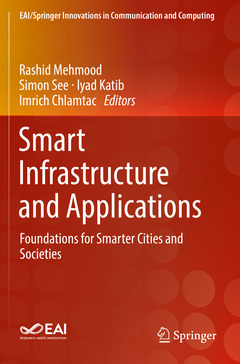Description
Smart Infrastructure and Applications, 1st ed. 2020
Foundations for Smarter Cities and Societies
EAI/Springer Innovations in Communication and Computing Series
Language: English
Subjects for Smart Infrastructure and Applications:
Keywords
smart transportation systems; smart and personalized healthcare systems; smart buildings; smart homes and smart energy grids; innovation and entrepreneurship in smart society settings; Social capital development; eLearning and distance learning for smart societies; Social intervention methodologies; Smart living and living spaces; Smart environment; landscape/regional and urban planning
Publication date: 08-2020
Support: Print on demand
Publication date: 07-2019
665 p. · 15.5x23.5 cm · Hardback
Description
/li>Contents
/li>Biography
/li>Comment
/li>
This book provides a multidisciplinary view of smart infrastructure through a range of diverse introductory and advanced topics. The book features an array of subjects that include: smart cities and infrastructure, e-healthcare, emergency and disaster management, Internet of Vehicles, supply chain management, eGovernance, and high performance computing. The book is divided into five parts: Smart Transportation, Smart Healthcare, Miscellaneous Applications, Big Data and High Performance Computing, and Internet of Things (IoT). Contributions are from academics, researchers, and industry professionals around the world.
Chapter1: Enterprise Systems for Networked Smart Cities.- Chapter2: Sentiment Analysis of Arabic Tweets for Road Traffic Congestion and Event Detection.- Chapter3: Automatic Detection and Validation of Smart City Events Using HPC and Apache Spark Platforms.- Chapter4: In-Memory Deep Learning Computations on GPUs for Prediction of Road Traffic Incidents using Big Data Fusion.- Chapter5: Hybrid Statistical and Machine Learning Methods for Road Traffic Prediction: A Review and Tutorial.- Chapter6: Comparison of Decision Trees and Deep Learning for Object Classification in Autonomous Driving.- Chapter7: A Smart Disaster Management System for Future Cities using Deep Learning, GPUs, and In-Memory Computing.- Chapter8: Parallel Shortest Path Big Data Graph Computations of US Road Network using Apache Spark: Survey, Architecture, and Evaluation.- Chapter9: A Survey of Methods and Tools for Large-Scale DNA Mixture Profiling.- Chapter10: An Architecture to Improve Security of Cloud Computing in Healthcare Sectors.- Chapter11: The Role of Big Data and Twitter Data Analytics in Healthcare Supply Chain Management.- Chapter12: A Mobile Cloud Framework for Context-aware and Portable Recommender System for Smart Markets.- Chapter13: Association Rule Mining in Higher Education: A Case Study of Computer Science Students.- Chapter14: SelecWeb: A Software Tool for Automatic Selection of Web Frameworks.- Chapter15: On Performance of Commodity Single Board Computer based Clusters: A Big Data perspective.- Chapter16: Parallel Iterative Solution of Large Sparse Linear Equation Systems on the Intel MIC Architecture.- Chapter17: Performance Characteristics for Sparse Matrix Vector Multiplication on GPUs.- Chapter18: HPC-Smart Infrastructures: A Review and Outlook on Performance Analysis Methods and Tools.- Chapter19: Big Data Tools, Technologies andApplications: A Survey.- Chapter20: Big Data for Smart Infrastructures Design: Opportunities and Challenges.- Chapter21: Software Quality in the era of Big Data, IoT and Smart Cities.- Chapter22: Open Source and Open Data Licenses in the Smart Infrastructure Era: Review and License Selection Frameworks.- Chapter23: Big Data and HPC Convergence for Smart Infrastructures: A Review and Proposed Architecture.- Chapter24: Towards a Runtime Testing Framework for Dynamically Adaptable Internet of Things Networks in Smart Cities.- Chapter25: HCDSR: A Hierarchical Clustered Fault Tolerant Routing Technique for IoT based Smart Societies.- Chapter26: Security Testing of Internet of Things for Smart City Applications: a Formal Approach.
Rashid Mehmood: Rashid Mehmood is the Research Professor of Big Data Systems and the Director of Research, Training, and Consultancy at the High Performance Computing Centre, King Abdulaziz University, Saudi Arabia. He has gained qualifications and academic work experience from universities in the UK including Cambridge and Oxford. Rashid has over 20 years of research experience in computational modelling and simulation systems coupled with his expertise in high performance computing. His broad research aim is to develop multi-disciplinary science and technology to enable a better quality of life and Smart Economy with a focus on real-time intelligence and dynamic system management. He has published over 150 research papers including 5 edited books. He has organised and chaired international conferences and workshops in his areas of expertise including EuropeComm 2009 and Nets4Cars 2010 - 2013. He has led and contributed to academia-industry collaborative projectsfunded by EPSRC, EU, UK regional funds, and Technology Strategy Board UK with the value over £50 million. He is a founding member of the Future Cities and Community Resilience (FCCR) Network. He is a member of ACM, OSA, Senior Member IEEE and former Vice-Chairman of IET Wales SW Network.
Simon See: Prof. Simon See is currently the Solution Architecture and Engineering Director and Chief Solution Architect for Nvidia AI Technology Center. He is also a Professor and Chief Scientific Computing Officer in Shanghai Jiao Tong University. Prof. See is also the Chief Scientific Computing Advisor for BGI (China) and has a position in NanyangTechnological University (Singapore) and King-Mong Kung University of Technology (Thailand). Prof See is currently involved in a number of smart city projects, especially in Singapore and China. His research interests are in the area of High Performance Computing, Big Data, Artificial Intelligence, machine learning, computational science,A




